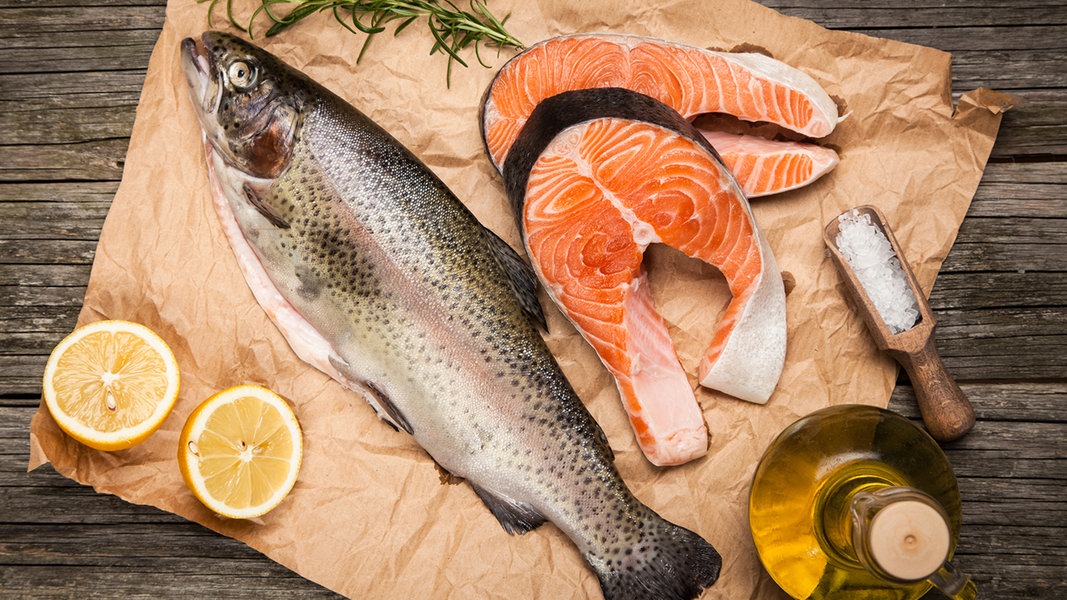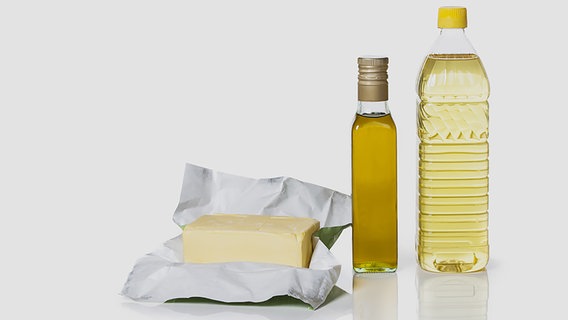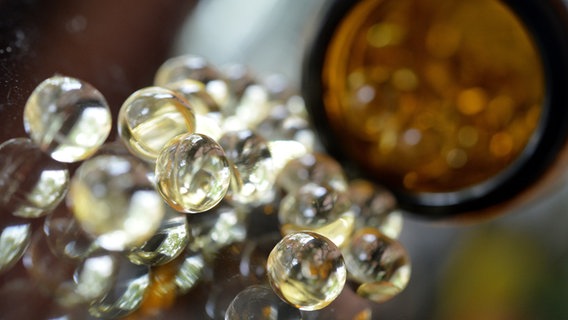Status: 05.09.2022 2:20 p.m
Omega-3 fatty acids from fish, algae or nuts and seeds are said to have almost miraculous health effects. Recent studies underscore their benefits.
Salmon, herring, mackerel and anchovies in particular, but also linseed, walnuts, hemp and certain oils are known for their high content of omega-3 fatty acids. Lately one hears again and again about so-called “algae oils”. what’s up And what is the so-called omega balance all about?
Effect of omega-3 fatty acids in the body
In fact, omega-3 fatty acids are of great importance for human metabolism. They are building blocks of our cell membranes and keep the cell envelopes supple. They are also required for the production of various tissue hormones (the body’s own messenger substances). Studies have also shown that omega-3 fatty acids strengthen the immune system and reduce inflammatory processes.
Vital building blocks in the organism
Omega-3 belong to the so-called polyunsaturated fatty acids. Three of them are particularly important for the human body: Firstly, the vegetable omega-3 fatty acid ALAand on the other hand the two omega-3 fatty acids obtained mainly from fish or algae DHA and EPA.
Treat sensitive omega-3 vegetable oils properly
Flaxseed and flaxseed oil contain a particularly large amount of ALA.
The main vegetable supplier of omega-3 fatty acids is linseed oil. A hundred years ago it was almost the only oil in Germany. Then the flax plant, also known as flax (supplier of linen), was almost forgotten for a long time.
Edible oil, among other things, is pressed from the seeds of the flax. Linseed oil has a slightly nutty taste and goes well with salads or quark with boiled potatoes. Cream cheese gets a special touch from the oil.
Recipe
Due to its particularly high content of the valuable omega-3 fatty acid ALA, linseed oil is very sensitive to light and goes rancid easily. You should already pay attention to high-quality production when shopping – the criteria: organic, pressed cold or with the exclusion of light, heat or oxygen, for example with the “Omega-safe” or “Oxyguard” process. The oil should be stored in a dark and airtight place, used fresh and consumed within three weeks of opening, otherwise the positive health effects will be lost. Important: Linseed oil should never be heated.
Farmed salmon: higher percentage of omega-6
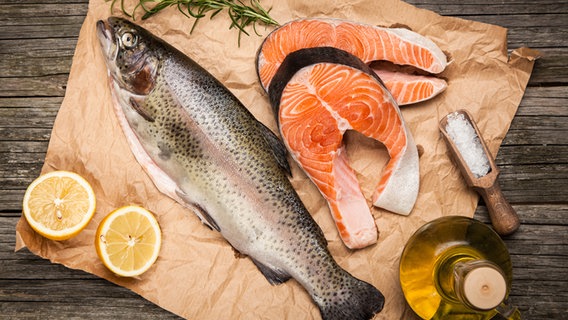
Fatty fish like salmon contain large amounts of unsaturated fatty acids.
Salmon is particularly popular among the omega-3-rich fish. Today it mainly comes from large breeding farms. There, the predatory fish gets more vegetable food, which has a higher proportion of omega-6 than its natural animal food. There is a fear that the ratio of omega-6 to omega-3 in salmon will deteriorate as a result. Samples show, however, that the ratio can still be favorable for farmed salmon.
The “omega balance” is extremely important
In order for omega-3 fatty acids to work well in the body, our diet must not contain too many omega-6 fatty acids. The omega-6 fatty acids are found, for example, in sunflower or safflower oil and often in ready-made foods.
Why is omega balance so important? Because our metabolism processes omega-6 and omega-3 fatty acids using the same enzyme. If all enzymes are “occupied” with omega-6 fatty acids, the body cannot absorb omega-3.
On average, our food today contains 10 to 20 times more omega-6 than omega-3 fatty acids. The ratio of omega-6 to omega-3 should actually be between 1:1 and 5:1.
Blood test determines the omega index
Thus, for an adequate supply of omega-3 fatty acids, not only how much fish or flaxseed oil you eat is decisive, but also the “overall balance” of the fats consumed. Actual exposure may vary from person to person. A special blood test was developed to determine how much EPA and DHA actually reach the blood. He takes advantage of the fact that fatty acids accumulate on red blood cells and can be measured there. A so-called omega-3 index of 8 to 11 percent is considered optimal. However, the determination of this laboratory value is not routine and is not paid for by health insurance companies.
Omega-3 capsules from the pharmacy and dietary supplements
Due to the numerous health-promoting effects of omega-3 fatty acids, they are now successfully sold as dietary supplements. While prescription drugs from the pharmacy consistently contain 460 mg EPA and 380 mg DHA in 1000 mg of omega-3 fatty acids, the amounts in over-the-counter dietary supplements vary considerably. The consumer center mention, thatthat the manufacturers of dietary supplements only have to state the total content of omega-3 fatty acids and not how much ALA, EPA or DHA is contained individually.
Further information
Foods with added omega-3
The food industry has embraced omega-3 fatty acids as a marketing factor and is now adding seaweed extracts (EPA/DHA) to many foods, from soy milk to fish stick breading. This increases the price of such products, but it does not turn an unhealthy food into a healthy one.
Algae oil as a dietary supplement
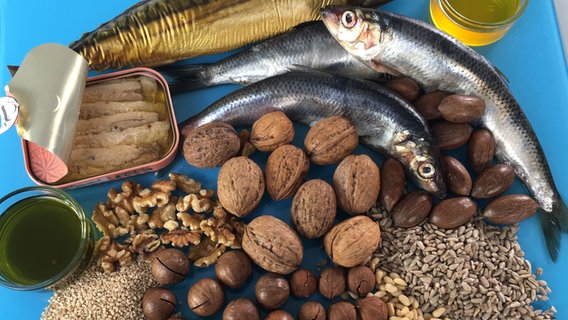
Few foods contain omega-3 fatty acids.
So-called algae oils are relatively new on the market. There are two different things behind this: on the one hand cooking oils (e.g. linseed or olive oil) with EPA and DHA additives, on the other hand pure algae oils. The latter can also be bought in capsule form.
Algae oil is derived from microalgae – not the large algae used in sushi or other Japanese specialties. Algae oil is iodine-free. The microalgae grow in special breeding facilities, so-called aquacultures. The omega-3-rich oil is extracted from the algae biomass using complex processes. Algae oil is a purely vegetable alternative for people who do not want to eat fish or fish oil.
Discuss daily requirement and dosage with doctor
As with everything, the same applies to healthy omega-3 fatty acids: do not do too much of a good thing. The Federal Institute for Risk Assessment recommended in 2009 in an opinion for healthy consumers, a maximum of 1.5 grams of EPA/DHA per day on average. The European food safety authority EFSA, on the other hand, sees in one Opinion of 2012 the intake of up to 5 grams of EPA and DHA (in combination) for adults as harmless to health.
In any case, it makes sense to talk to your doctor or pharmacist before buying food supplements, because omega-3 fatty acids also influence blood clotting. Anyone who takes omega-3 in increased doses as a dietary supplement may have an increased tendency to bleed, which can be seen, for example, in nosebleeds. This applies all the more to patients who are already taking medication to inhibit blood clotting.
Further information

